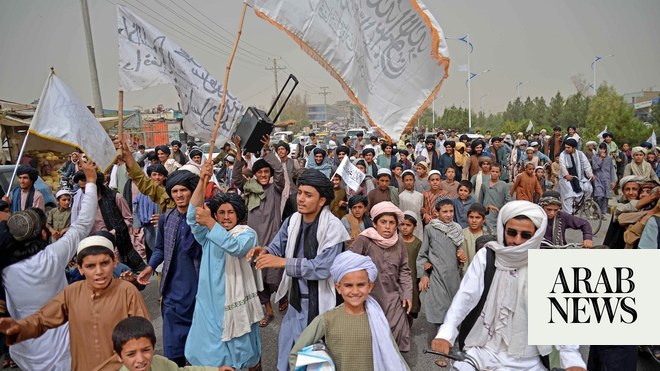
Over 50% of Afghan households still “struggle to maintain their livelihoods and consumption,” according to the World Bank
Taliban have imposed increasing restrictions on women and girls, including bans on university education and public spaces
KABUL: The Taliban said on Tuesday they are committed to serving Afghans within their “framework of Shariah” as they celebrated the second anniversary of their takeover of Kabul.
After two decades of war that killed tens of thousands of Afghans on their soil, the fall of Kabul on Aug. 15, 2021 marked the Taliban’s return to power, which was followed by foreign military pulling out from the country and the collapse of the US-backed government led by Ashraf Ghani.
“On the arrival of the second anniversary of the conquest of Kabul, we would like to congratulate the mujahid (holy warrior) nation of Afghanistan and ask them to thank Almighty Allah for this great victory,” the Taliban said in a statement on Tuesday, which was declared a national holiday for the occasion.
“Now that overall security is ensured in the country, the entire territory of the country is managed under a single leadership, Islamic system is in place and everything is explained from the angle of Shariah … The officials of the Islamic Emirate are committed to serving their people within the framework of the Islamic Shariah as long as they are alive and will work for the development and stability of the country.”
While the new rulers are not officially recognized by any country in the world, security in the country has been “stable” in the two years since their takeover, said security expert Mohammed Sadiq Shinwari.
“The safety of the people is assured compared to the past as the Taliban have control in all 34 provinces … Within the last two years, security concerns were addressed and people can travel to any province without any fear. Thus, we can say a huge difference can be seen compared to the past,” Shinwari told Arab News.
“People can feel safety and stability from the past two years but there are (also) economic problems,” he added.
Afghanistan’s aid-dependent economy plunged into a freefall after the Taliban took over, but the World Bank reported last month that the local currency, the afghani, gained value against major currencies as exports increased by 9 percent between January and May this year. It also noted an improvement in job opportunities for both skilled and unskilled laborers since March 2023.
However, over half of Afghan households still “struggle to maintain their livelihoods and consumption,” according to the World Bank.
“Like other Afghans, I have faced a lot of problems: economic problems, social problems, etc. When the previous government fell, I lost my job while I was supporting my family,” Shah Wali Khan Safi, who has been unemployed since the Taliban takeover, told Arab News.
Safi had previously worked as an IT engineer for the military and said he was forced to sell some of his prized possessions “because of the bad economic situation.”
Afghanistan’s current economy is “full of worries and concerns,” said Nazakmir Ziyarmal, an economy expert based in Kabul.
“Afghanistan will not be able to recover the country’s economy alone,” Ziyarmal told Arab News. “It needs to have more and more interaction with the international community so that we can receive at least some humanitarian assistance for a short time.”
Taliban authorities have called for sanctions to be removed and billions in frozen funds to be released to alleviate Afghans’ sufferings, but the international community is only willing to take such steps once the government takes certain actions, such as lifting restrictions on girls and women.
Yet despite initial promises of a more moderate rule than their previous stint in power in the 1990s, the Taliban have imposed increasing restrictions on the rights of women and girls, including stopping girls from receiving education beyond the sixth grade and banning women from public spaces.
“Afghan women have experienced very difficult days in the last two years,” Zakira Sadat, a women’s rights activist in Kabul, told Arab News. “If this continues, we Afghan women have no hope for our future.”
Taliban’s treatment of girls and women has sparked widespread international condemnation, but those protests have done little to force change. As global attention comes and goes, many Afghans feel like they have been left behind.
“We are tired of the international messages about women’s rights on social media. We hope that they will give action to their promises and implement them,” Sadat said.
“Those countries that have been shouting for the rights of Afghan women for 20 years and have claimed human rights, spent billions of dollars to invest in women, where are they now and why are they silent? Why do they ignore the situation of Afghan women and think that everything is fine here?”












